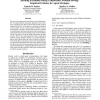Free Online Productivity Tools
i2Speak
i2Symbol
i2OCR
iTex2Img
iWeb2Print
iWeb2Shot
i2Type
iPdf2Split
iPdf2Merge
i2Bopomofo
i2Arabic
i2Style
i2Image
i2PDF
iLatex2Rtf
Sci2ools
118
click to vote
AAAI
1996
1996
Deciding to Remind During Collaborative Problem Solving: Empirical Evidence for Agent Strategies
Previous work suggests that reminding a conversational partner of mutually known information depends on the conversants' attentional state, their resource limits and the resource demands of the task. In this paper, we propose and evaluate several models of how an agent decides whether or not to communicate a reminder. We elaborate on previous findings by exploring how attentional state and resourceboundsare incorporated into the decision making processso that reminders aid the performance of agents during collaborative problem solving. We test two main hypotheses using a multi-agent problem solving simulation testbed: (1) an agent decides to present salient knowledge only when it reduces overall problem solving effort (2) an agent can useits own attentional state as a model of the attentional state of its partner when assessing the effort trade-offs of communicatinga reminder. Our results support both hypotheses, suggesting that the models we propose should be further tested for ...
AAAI 1996 | Attentional State | Collaborative Problem Solving | Intelligent Agents | Problem Solving |
| Added | 02 Nov 2010 |
| Updated | 02 Nov 2010 |
| Type | Conference |
| Year | 1996 |
| Where | AAAI |
| Authors | Pamela W. Jordan, Marilyn A. Walker |
Comments (0)

